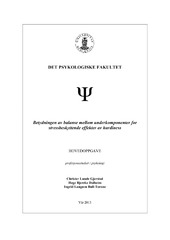| dc.contributor.author | Gjerstad, Christer Lunde | |
| dc.contributor.author | Dalheim, Hege Bjercke | |
| dc.contributor.author | Bull-Tornøe, Ingrid L | |
| dc.date.accessioned | 2013-09-04T12:01:35Z | |
| dc.date.available | 2013-09-04T12:01:35Z | |
| dc.date.issued | 2013-04-13 | eng |
| dc.date.submitted | 2013-04-13 | eng |
| dc.identifier.uri | https://hdl.handle.net/1956/7048 | |
| dc.description.abstract | The present exploratory study investigated whether an alternative operationalization of hardiness would be of significance to the effect of hardiness on the relationship between stress and health complaints. The operationalization included a criterion of balance between the three subcomponents of hardiness; commitment, control, and challenge. It was hypothesised that hardiness would interact with stress, so that high hardiness scores would reduce the negative effects of stress on health complaints. In addition, it was hypothesised that the combination of high and balanced hardiness scores would reduce the negative effects of stress even further. A total of 178 Norwegian soldiers were studied in the context of a six-month peacekeeping operation in Kosovo. Hardiness was measured before deployment, stress was measured during deployment, and health complaints were measured both before and during deployment. Regression analyses showed that high hardiness scores did not reduce negative effects of stress on health complaints. However, among participants with high hardiness scores, those with a balanced score reported significantly fewer health complaints during stressful circumstances, than did those with an unbalanced score. The results indicate that having a high and balanced hardiness score predicts fewer health complaints during stressful circumstances than having a high and unbalanced score. The methodological and theoretical implications of this study are discussed. | en_US |
| dc.description.abstract | Denne utforskende studien undersøkte hvorvidt en alternativ operasjonalisering av hardiness ville ha betydning for effekten av hardiness på forholdet mellom stress og helseplager. Operasjonaliseringen inkluderte et balansekriterium mellom de tre underkomponentene av hardiness; commitment, control og challenge. Vi forventet at hardiness ville interagere med stress, slik at høye hardinesskårer ville redusere negative effekter av stress på helseplager. I tillegg forventet vi at kombinasjonen av høye og balanserte hardinesskårer ville redusere negative effekter av stress ytterligere. 178 norske soldater ble studert i løpet av en seks måneder lang fredsbevarende operasjon i Kosovo. Hardiness ble målt før avreise, stress ble målt i løpet av tjenesteoppholdet og helseplager ble målt både før og under tjenesteoppholdet. Regresjonsanalyser viste at høye hardinesskårer ikke reduserte negative effekter av stress på helseplager. Imidlertid rapporterte deltakere med høye og balanserte hardinesskårer signifikant færre helseplager under stressende betingelser enn de med høye og ubalanserte skårer. Resultatene indikerer at det å ha en høy og balansert hardinesskåre predikerer færre helseplager under stressende betingelser enn det å ha en høy og ubalansert skåre. Metodologiske og teoretiske implikasjoner av studien diskuteres. | en_US |
| dc.format.extent | 403938 bytes | eng |
| dc.format.mimetype | application/pdf | eng |
| dc.language.iso | nob | eng |
| dc.publisher | The University of Bergen | eng |
| dc.subject | Hardiness | eng |
| dc.subject | Stress | eng |
| dc.subject | Health complaints | eng |
| dc.subject | Military psychology | eng |
| dc.subject | Helseplager | eng |
| dc.subject | Militærpsykologi | eng |
| dc.title | Betydningen av balanse mellom underkomponenter for stressbeskyttende effekter av hardiness | eng |
| dc.type | Master thesis | |
| dc.rights.holder | Copyright the author. All rights reserved | |
| dc.description.localcode | PSYK300 | |
| dc.description.localcode | PRPSYK | |
| dc.subject.nus | 736102 | eng |
| fs.subjectcode | PSYK300 | |
| bibo.issue | | |
